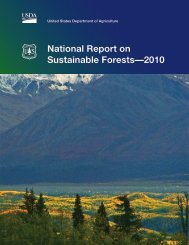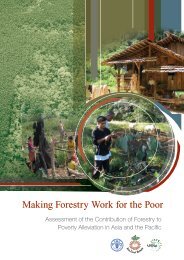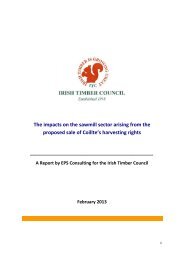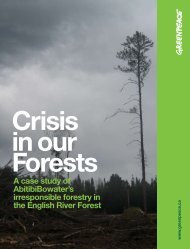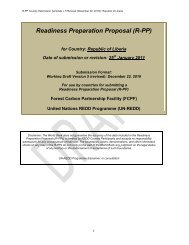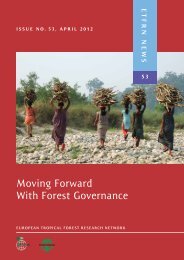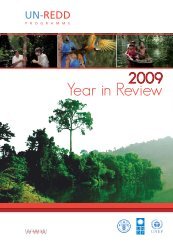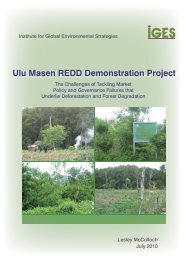pdf 1242 KByte - JIKO
pdf 1242 KByte - JIKO
pdf 1242 KByte - JIKO
You also want an ePaper? Increase the reach of your titles
YUMPU automatically turns print PDFs into web optimized ePapers that Google loves.
Policy Paper: Assessing prerequisites for market-based REDD+ activities 26<br />
3.3.5 LEEE implications<br />
Policy readiness of REDD+ countries has important implications for all four LEEE elements. The identification<br />
of drivers of deforestation is not only a prerequisite for an effective and efficient tackling of forest destruction<br />
but has also serious repercussions on legitimacy and equity. Overestimating particular drivers while<br />
neglecting others will not only result in misallocation of funds but may also undermine overall legitimacy of<br />
the policies. Furthermore, REDD+ can only be implemented in an equitable way if the policies also address<br />
the underlying causes of deforestation and not just its agents. This is particularly relevant when dealing with<br />
subsistence farmers practicing shifting cultivation and other forest-dependent peoples, who need viable alternatives<br />
to the extensive exploitation of forest resources.<br />
The choice of the right forestry policy approach also has different repercussion on the efficiency, effectiveness,<br />
equity and legitimacy of the national REDD+ structure. While a national PES system is often expected<br />
to deliver the most effective results due to its market-based approach, the diversity of individual opportunity<br />
costs may lead to over- and underpayments of participants, drastically reducing its effectiveness. Geographical<br />
differentiation of payments and the combination with community forest management may mitigate these<br />
risks. Due to their limited size, forest concessions will generally have only a reduced carbon impact, particularly<br />
in the long run. Such an approach may further be problematic with regards to equity in cases where the<br />
activities affect forest dependent communities living in the area, making safeguarding principles particularly<br />
relevant. In the short run, however, conservation projects can lead to more efficient results provided that land<br />
ownership of the respective area is clarified and undisputed (Costenbader 2011). Systems based on community<br />
forest management can be expected to deliver efficient results, especially if combined with community<br />
forest monitoring. The legitimacy of such an approach may also be larger since acceptance of activities<br />
among individuals may be higher if promoted with the assistance of the local authorities. With any of these<br />
three approaches discussed the government will have to ensure that the system is designed in such a way that<br />
participation of those who need the revenues most urgently is safeguarded. Furthermore, aligning the<br />
REDD+ strategy with other low carbon development plans can further increase effectiveness of the activities.<br />
The question on the appropriate forestry policy approach is strongly linked to the choice of a system for<br />
channelling the international funds. As this brief overview showed, every single financial design option<br />
has its advantages and shortcomings with regard to effectiveness, efficiency, equity and legitimacy. These<br />
shortcomings should be carefully assessed taking into consideration the national circumstances. Furthermore,<br />
it should be noted that options are not mutually exclusive and a combination of systems might represent the<br />
best solution. In any case, REDD+ countries will need to identify the architecture best suiting its national<br />
conditions. It has to be further kept in mind that developments at the international level will influence and<br />
potentially limit the options countries have when designing their national funding system.<br />
Nicolas Kreibich, Christof Arens and Wolfgang Sterk<br />
Wuppertal Institute




